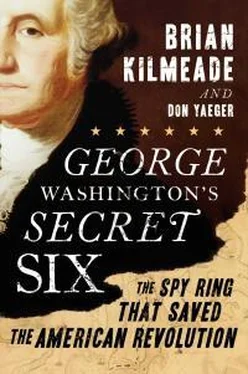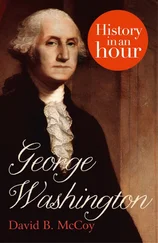In mid-December 1776, Benjamin Tallmadge was appointed captain of the Second Continental Light Dragoons by General George Washington himself, who had admired the young man’s abilities and conduct, not to mention his loyalty. The appointment was signed in the unmistakable hand of John Hancock, and Tallmadge accepted it willingly. He devoted the first third of 1777 to training men and horses for reconnaissance, scouting missions, and light raids ahead of the more heavily armed cavalry and artillery brigades, a job, Tallmadge later wrote, that he enjoyed thoroughly: “My own troop was composed entirely of dapple gray horses , which, with black straps and black bear-skin holster-covers, looked superb. I have no hesitation in acknowledging that I was very proud of this command.”
Tallmadge continued his dedicated and distinguished service, and a promotion to major followed in April 1777. At the end of that year, something happened that would change his career. After an attack on his troops, Tallmadge received word of an unusual nature. As he described it, “a country girl had gone into Philadelphia; with eggs, instructed to obtain some information respecting the enemy.” Arrangements were made that she should meet Tallmadge at the Rising Sun Tavern, where she quickly passed on all information about troop numbers and supply counts that she had been able to gather, likely from another sympathetic contact inside the city.
But the Rising Sun was not an ideal place for cover, as it was clearly visible from the British lines, and Tallmadge was spotted and identified entering the establishment. While the girl was still offering her report, the alarm was sounded that an armed British guard was fast approaching; Tallmadge dashed outside, swung the girl up behind him on his horse, and the two took off at full speed, streaking toward Germantown, a little more than three miles away, with the British in close pursuit. Once in the safety of town, the girl dismounted and disappeared, and Tallmadge began to make his way back to his unit.
But the experience of the young citizen-spy stayed with him. “During the whole ride,” he recorded in his memoirs, “although there was considerable firing of pistols, and not a little wheeling and charging, she remained unmoved, and never once complained for fear after she mounted my horse. I was delighted with this transaction, and received many compliments from those who became acquainted with it.”
Bravery and resolve from the most unlikely corners could still be counted on to rise to the challenge and take on whatever mission was necessary for the sake of freedom. The safety of those souls was also a sacred trust. That much was clear to Tallmadge, and soon he would not only have another chance to see such courage in action but also be a willing player.
During that brutal winter of 1777 and into January 1778, Tallmadge stayed close to General Washington at Valley Forge; in such cramped and miserable quarters, the young officer impressed his commander. He was still somewhat untested and not always as farsighted as more seasoned officers, but it was clear that both his input and his unsinkable enthusiasm were valued by both subordinates and superiors.
When Washington tapped him to act as spymaster on Long Island, Tallmadge acted quickly. He knew right away whom he would approach to be his man on the ground.
CHAPTER 4 Crossing the Sound
Growing up, Abraham Woodhull had been a neighbor of Tallmadge’s, and he shared many of the young officer’s ideals, but that’s where their resemblance ended. By all accounts, Woodhull was no bright-eyed, optimistic, jolly-young-man-turned-soldier who ran eagerly into the welcoming arms of the American cause. His sentiments lay with liberty, but as a confirmed bachelor and self-proclaimed old man before the age of thirty, he put such a premium on personal autonomy that he avoided official military service, where he would have been subject to the orders of superiors.
Abraham was his parents’ third son, raised under the shadow of a prominent and celebrated family (which included the ill-fated General Nathan Woodhull, a cousin) to be neither the heir nor the spare to the paternal estate. While his older brothers, Richard V and Adam, were groomed to step into the role of American gentlemen, young Abraham was released to the freedom of the outdoors. It was a dismissal he neither minded nor resented, as he found the tedium of schoolwork uninspiring. While his brothers were laboring over passages of classical rhetoric, Abraham gained an intimate knowledge of the landscape of Long Island, connecting every topographical feature with its owner.
The Woodhull girls, Susannah and Mary, doted on their baby brother, and Abraham was equally fond of them. When Mary married Amos Underhill and moved with him to Manhattan, Abraham made a habit of visiting them. Sometimes he traversed Long Island and then crossed the East River to Manhattan, and other times he caught a ride with a longshoreman rowing across Long Island Sound to Connecticut and then traveled southward to the city. He enjoyed these trips, but the family was soon to face difficult times. In 1768, at the age of twenty-one, Adam died; six years later, at the age of thirty, Richard V died. And so, in 1774, Abraham found himself suddenly and unexpectedly in position to inherit the Woodhull family’s homestead.
It was a windfall he had neither hoped for when it was out of reach nor relished now that it was his. He had never considered himself cut from the same fabric as the rest of the prominent landowners, and had gone to some pains to distinguish himself from their upright and uptight behavior. Abraham Woodhull was proud of being the black sheep of his straitlaced family, and he assumed the burden of familial duty with reluctance; it smacked of Old World thinking. If he was to reject King George’s authority on the basis that the monarch had simply been born into his position, why could he not also reject his own family’s expectations for him to pick up the mantle of Woodhull respectability simply because he was the sole surviving son-of-a-son-of-a-son-of-a-son-of-a-son?
OCCUPIED NEW YORK
When war erupted the following year, Woodhull’s journeys to Manhattan by both the northern and the southern routes became more perilous, though he continued to visit his sister whenever he could. By 1777, New York had fallen from quite a height of Patriotic fervor. Manhattan and its surrounding areas had always leaned Loyalist, but in the early years of the conflict, there was still a significant Patriot population. When the newly penned Declaration of Independence was read publicly the summer before, the reaction had been wildly enthusiastic. Rowdy Patriots tore down a statue of King George in spontaneous protest and melted its four thousand pounds of lead for bullets. General George Washington, while appreciating the mettle (and resourcefulness) demonstrated, chastised some of his own officers involved in what he viewed as an undignified and disrespectful act.
After the British proved victorious at the Battle of Brooklyn and then with the fall of Manhattan, in August and September of 1776, respectively, there was a demographic shift as many Patriots left the city for more like-minded locales and Loyalists flooded into the city that was viewed as a safe haven for those who sided with the Crown. The fire that raged through a significant portion of the city following the Americans’ retreat also contributed to the change in population. More than one Patriot lost his home or business to the fire. It might have been worth staying and rebuilding had the conquering army been a sympathetic one, but the loss of shelter, livelihood, and political power was too much for many people to bear all at once.
What destruction and politics didn’t drive out, filth did. Nicholas Cresswell, an Englishman visiting New York, recorded his disgust with the state of the city following the winter thaw in the spring of 1777. He complained about the sheer number of people crowded into the city’s confines, “almost like herrings in a barrel, most of them very dirty and not a small number sick of some disease, the Itch, Pox, Fever, or Flux.” He further opined, “If any author had an inclination to write a treatise upon stinks and ill smells, he never could meet with more subject matter than in New York.”
Читать дальше












